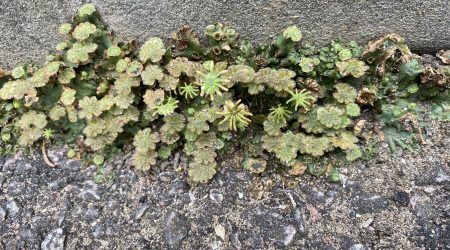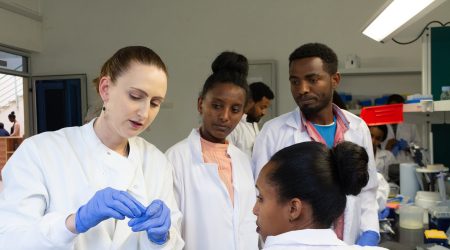The many ingredients of food security; introducing Natasha Grist and Peter Emmrich from the Norwich Institute of Sustainable Development

Earlier this month we launched the Norwich Institute for Sustainable Development, a cross-Norwich Research Park collaboration focusing on food security and sustainability.
NISD plans to bring together excellent bioscience with expertise in international development and climate science, helping build more resilient and sustainable agricultural systems around the world to improve food security.
We sat down with Dr Peter Emmrich and Dr Natasha Grist to ask them about the new institute, launched with generous initial funding from the John Innes Foundation, and how they got involved.
Peter – “I did my PhD at the John Innes Centre, finishing that back in 2016. From there I had a Postdoctoral position for a year, before moving out to Nairobi to work with the BecA-ILRI hub.
My work in Kenya was partly capacity-building but predominantly I focussed on grass pea (Lathyrus sativus), which is an ancient food crop with remarkable tolerance to drought and flooding.
These characteristics makes the crop highly valuable for enhancing food security in areas prone to such weather extremes, especially in the face of a changing climate.
Unfortunately, the downside of grass pea is that it produces a toxin – beta-L-ODAP – that can cause paralysis if consumed excessively during an extended period of malnourishment.
Grass pea is safe to eat as part of a normal diet. However, because the crop can survive weather extremes that would cause other crops to fail, people sometimes rely on grass pea as a staple food to stave off starvation. This puts them at risk of toxicity.
The focus of my work has been to remove this toxin and to develop safe varieties of grass pea, using a variety of traditional and modern breeding tools.
My experience of being in Kenya and close to the people my research is aiming to benefit allowed me to understand much more of the complexity and hurdles in taking a discovery from the lab, out to helping people in the real world.
I have long been interested in international development and wanted to understand how to make my research more impactful, which is where the NISD comes in.”
Natasha – “I am coming at this from the other direction as my background is in sustainable agriculture and climate change.
I did my Masters, PhD and postdoc at UEA, learning with colonist farmers in the Brazilian Amazon about their peripatetic lives and farm management systems, and the wider contexts and drivers for their deforestation practices.
Once the forest is burned in many of those areas the soil is poor, red, highly weathered, and yields are often low.
Other farmers found pockets of fertile land, managed them effectively and provided for their families. But of course, we know that when you are poor, there are often few options for making a living, and long term, and even short term, environmental concerns are way down the list of priorities.
Both government policy and market forces have a big part to play in improved environmental management. I could also see that most farmers, along with many of us at that time in the early 2000s, were unaware of the huge additional challenges coming from climate change.
So, in 2008 I joined the Overseas Development Institute research thinktank to advise UN organisations, governments, funders and NGOs on adaptation to climate change in smallholder agriculture, helping to improve both existing and new programmes, mostly in countries across sub-Saharan Africa.
Like Peter, I found that being around farmers in developing countries is essential to co-creating any effective interventions. However, I’d always planned to return to UEA eventually, wanting to enrich our research and engagement here with what I’ve learned elsewhere, and this opportunity with NISD seemed a perfect fit as it allows us to answer some of the biggest questions, together.
As for the questions we will tackle with NISD, there are many options and techniques which could improve farmers’ livelihoods and wellbeing. We are now identifying areas where the NISD can contribute to the global solutions with our unique combination of scientists and research interests.
One really exciting area for potential collaborations across the NRP is research into the potential for legumes and, more broadly, the role of plant-based diets in improving nutrition and food security alongside other environmentally sustainable practices.
There are lots of questions to be answered here about nutrition, context and applicability in different food cultures, as well as how to engage people in dietary shifts.
With the John Innes Centre, an obvious combination is developing social science support around ongoing crop breeding.
Crop breeding is one tool in the box with potential to improve yields and environmental sustainability, but so far there hasn’t been enough prioritisation and investment within our institutions in understanding the layers outside the pure science for it to work in practice, and we think we can do better.
We can work with researchers from other institutes in the NISD to develop ways to work more closely with farmers, co-creating knowledge and developing innovations that have a better chance of supporting them better, and faster.
Peter – “That’s right and I think it is an important point – a combination of disciplines can benefit from working together.
The transfer of knowledge isn’t one-way, biosciences allow us to breed improved crops, but we need social sciences to understand what improvements will benefit farmers and what impacts new varieties and technologies will have on communities and ecosystems.
One should inform the other, in both directions. This will help us develop the crops and agricultural systems we need to face accelerating changes in the climate.
Agricultural sustainability must always include helping farmers to adapt to climate change and we are also going to study how food systems can help mitigate climate change. We have close links with the Tyndall Centre, and this is where Natasha’s background really comes in.”
Natasha – “I agree and I think that is in part why Peter and I are a good combination to contribute to the wider core team of the NISD. Initially our roles were envisaged to be one post, but as our skill-sets were very different, and complementary, the John Innes Foundation chose to support both of us.
There is a unique institutional collaboration opportunity here to bring all the extraordinary research in bioscience, crop improvement, international development and climate research that is being done here in Norwich together and make it relevant to the broader issue of sustainable development of agriculture and food security.
I don’t think this level of expertise exists in a comparable way, in one place, anywhere else in the world.”
Peter – “Absolutely, and we don’t want to stop there.
We want to speak to anybody who feels they can contribute to this broad goal of sustainable agriculture and food security, so if you think the NISD could support your work or future research interests, email us and let’s talk.”



